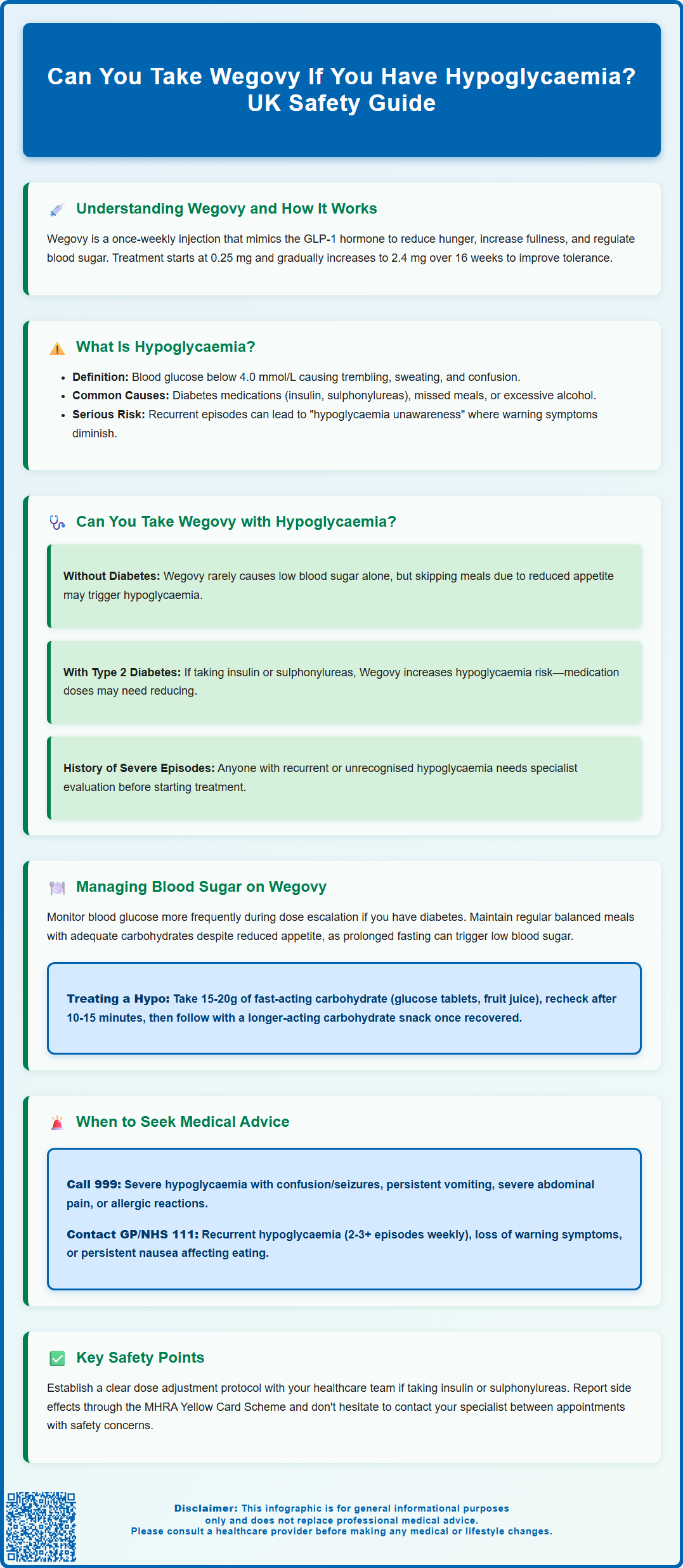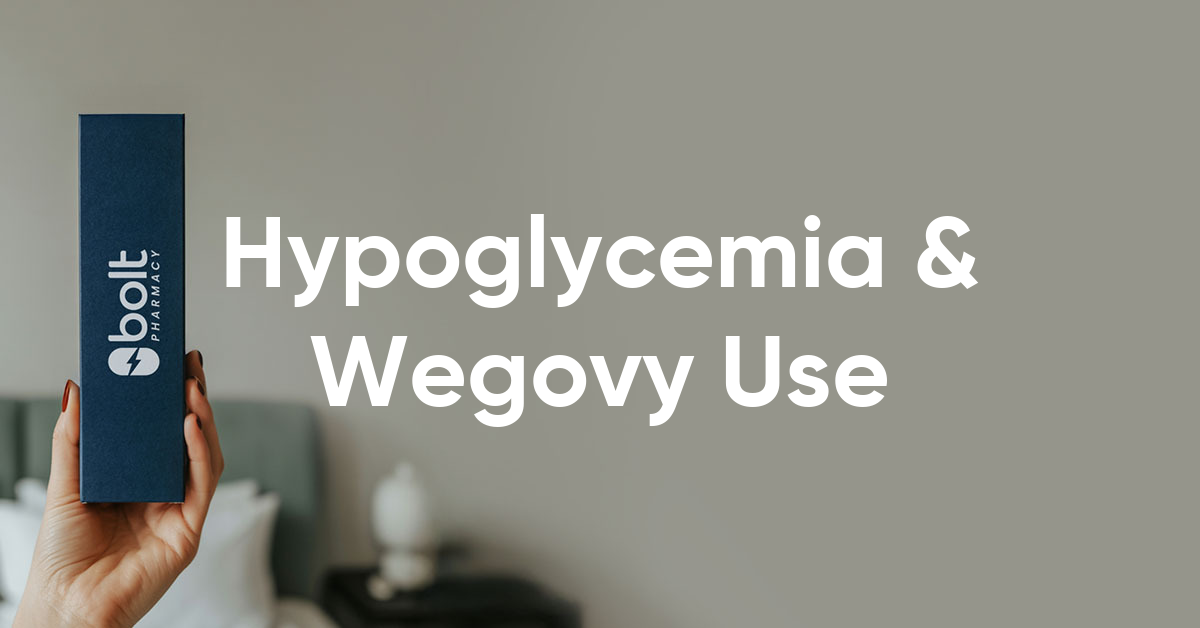Many people considering Wegovy (semaglutide) for weight management wonder whether it is safe if they have experienced hypoglycaemia (low blood sugar). Wegovy is a glucagon-like peptide-1 (GLP-1) receptor agonist licensed in the UK for obesity treatment, and whilst it affects glucose metabolism, its risk of causing hypoglycaemia varies significantly depending on whether you have diabetes and what other medications you take. Understanding this relationship is essential for safe use. This article examines the evidence, explores when Wegovy may or may not be suitable for people with a history of hypoglycaemia, and provides practical guidance on managing blood glucose levels during treatment.
Summary: Wegovy does not usually cause hypoglycaemia in people without diabetes when used alone, but those taking insulin or sulphonylureas face increased risk and may require medication dose reductions.
- Wegovy (semaglutide) is a GLP-1 receptor agonist that works through glucose-dependent mechanisms, meaning it primarily lowers blood sugar only when levels are elevated.
- In people without diabetes, Wegovy has a low intrinsic risk of hypoglycaemia, though reduced appetite may lead to inadvertent meal skipping in susceptible individuals.
- Concurrent use with insulin or sulphonylureas significantly increases hypoglycaemia risk, requiring careful dose adjustments before starting Wegovy.
- Regular blood glucose monitoring, maintaining consistent meal patterns, and carrying fast-acting carbohydrates are essential safety measures during treatment.
- Specialist weight management services should conduct thorough risk-benefit assessments for anyone with recurrent hypoglycaemia or hypoglycaemia unawareness before prescribing Wegovy.
Table of Contents
Understanding Wegovy and How It Works
Wegovy (semaglutide 2.4 mg) is a prescription medicine licensed in the UK for weight management in adults with obesity or those who are overweight with at least one weight-related comorbidity. It belongs to a class of medications called glucagon-like peptide-1 (GLP-1) receptor agonists, which were originally developed for treating type 2 diabetes.
The mechanism of action centres on mimicking the natural hormone GLP-1, which is released by the intestine after eating. Wegovy works through several pathways:
-
Appetite regulation: It acts on receptors in the brain to reduce hunger and increase feelings of fullness
-
Gastric emptying: It slows the rate at which food leaves the stomach, prolonging satiety
-
Insulin secretion: It enhances glucose-dependent insulin release from the pancreas
-
Glucagon suppression: It reduces glucagon secretion, which normally raises blood glucose
Wegovy is administered once weekly via subcutaneous injection, typically in the abdomen, thigh, or upper arm. The treatment follows a specific dose escalation schedule over 16 weeks (0.25 mg → 0.5 mg → 1.0 mg → 1.7 mg → 2.4 mg at 4-week intervals), though this may be delayed if not tolerated. According to NICE guidance (TA875), Wegovy should be prescribed as part of a specialist weight management service for up to 2 years, alongside a reduced-calorie diet and increased physical activity.
It is important to note that whilst Wegovy affects glucose metabolism, it is not licensed for treating diabetes in the UK—that indication applies to lower doses of semaglutide marketed under different brand names. Wegovy is not indicated for people under 18, those with type 1 diabetes, or during pregnancy and breastfeeding. It should not be used alongside other GLP-1 receptor agonists, and caution is needed regarding risks of pancreatitis, gallbladder disease, and dehydration.

Hypoglycaemia: Causes and Risk Factors
Hypoglycaemia refers to abnormally low blood glucose levels, typically defined as below 4.0 mmol/L, though symptoms can occur at higher levels in some individuals. It represents a potentially serious condition that requires prompt recognition and management.
In people without diabetes, hypoglycaemia is relatively uncommon but can occur due to:
-
Prolonged fasting or inadequate carbohydrate intake
-
Excessive alcohol consumption, particularly without food
-
Certain medications, including specific antibiotics (e.g., fluoroquinolones), quinine, and pentamidine (though these are rare causes)
-
Hormonal deficiencies affecting cortisol or growth hormone
-
Rare conditions such as insulinomas (insulin-producing tumours) or reactive hypoglycaemia
-
Critical illness or organ failure affecting the liver or kidneys
For individuals with diabetes, hypoglycaemia is more frequent and typically results from:
-
Insulin or sulphonylurea medications (such as gliclazide or glimepiride)
-
Missed or delayed meals after taking glucose-lowering medication
-
Increased physical activity without adjusting medication or food intake
-
Alcohol consumption which impairs the liver's glucose production
-
Medication errors or dose miscalculations
Symptoms of hypoglycaemia include trembling, sweating, anxiety, hunger, palpitations, confusion, and in severe cases, loss of consciousness or seizures. Beta-blockers may mask these warning symptoms. Recurrent hypoglycaemia can lead to hypoglycaemia unawareness, where warning symptoms diminish, increasing the risk of severe episodes. Understanding your personal risk factors is essential before starting any medication that affects glucose metabolism, including weight management treatments like Wegovy.
Can You Take Wegovy If You Have Hypoglycaemia?
The relationship between Wegovy and hypoglycaemia depends significantly on whether you have diabetes and what other medications you are taking. Wegovy does not usually cause hypoglycaemia in people without diabetes when used alone, as its glucose-lowering effects are glucose-dependent—meaning it primarily works when blood sugar levels are elevated.
For individuals without diabetes who experience occasional hypoglycaemia:
Wegovy has a low intrinsic risk of causing hypoglycaemia in the absence of other glucose-lowering drugs. However, because Wegovy reduces appetite and slows gastric emptying, some people may inadvertently eat less frequently or skip meals, which could potentially trigger hypoglycaemia in susceptible individuals. There is no official contraindication for Wegovy use in people with a history of non-diabetic hypoglycaemia, but careful monitoring is advisable.
For individuals with type 2 diabetes:
The situation requires more careful consideration. According to the Summary of Product Characteristics (SmPC) and MHRA guidance, when Wegovy is used alongside:
-
Insulin or sulphonylureas: There is an increased risk of hypoglycaemia, and dose reductions of these medications may be necessary before starting Wegovy
-
Metformin or other medications that don't typically cause hypoglycaemia: The risk remains low
Wegovy is not indicated for people with type 1 diabetes or for treating diabetic ketoacidosis. People with diabetes, particularly those on insulin, should also be aware of a potential risk of diabetic retinopathy complications, especially if blood glucose control improves rapidly. Regular retinal screening and prompt review of any visual symptoms are important.
If you have a history of recurrent or severe hypoglycaemia, particularly hypoglycaemia unawareness, your prescribing clinician will need to conduct a thorough risk-benefit assessment. This decision should be made collaboratively within a specialist weight management service, ideally with input from your diabetes care team if applicable.
Managing Blood Sugar Levels While Taking Wegovy
Effective blood glucose management whilst taking Wegovy requires a proactive, individualised approach, particularly during the initial months of treatment when doses are being escalated.
For people with diabetes taking glucose-lowering medications:
-
Medication review: Your healthcare team should review and potentially reduce doses of insulin or sulphonylureas before starting Wegovy
-
Blood glucose monitoring: Increase the frequency of self-monitoring, particularly before meals and at bedtime, especially during dose escalation
-
Recognise patterns: Keep a diary noting blood glucose readings, meal times, and any symptoms to identify trends
-
Adjust insulin doses: Work with your diabetes team to establish protocols for insulin dose adjustments based on readings and food intake
-
Carry glucose: Always have fast-acting carbohydrates available (glucose tablets, juice, or sweets) to treat hypoglycaemia promptly
For treating hypoglycaemia (for all at risk):
-
Take 15-20g of fast-acting carbohydrate (e.g., 4-5 glucose tablets, 150-200ml fruit juice, or 5-6 jelly babies)
-
Recheck blood glucose after 10-15 minutes
-
If still below 4.0 mmol/L, repeat the fast-acting carbohydrate
-
Once recovered, eat a longer-acting carbohydrate snack or meal (e.g., sandwich, cereal, or fruit with crackers)
-
Those at risk of severe hypoglycaemia should have glucagon available and ensure family members know how to use it
For people without diabetes:
-
Regular meals: Despite reduced appetite, maintain a regular eating pattern with balanced meals containing adequate carbohydrates
-
Recognise symptoms: Be aware of hypoglycaemia symptoms and don't dismiss them as general unwellness
-
Avoid prolonged fasting: Whilst Wegovy reduces hunger, extended periods without food may trigger low blood sugar in susceptible individuals
-
Moderate alcohol: Limit alcohol consumption and always consume it with food
General strategies for all patients:
Ensure adequate hydration, as Wegovy can cause gastrointestinal side effects that may affect fluid balance. If experiencing persistent vomiting or diarrhoea, seek medical advice promptly due to dehydration and acute kidney injury risk. Plan physical activity carefully, consuming appropriate carbohydrates before exercise if needed.
If you drive, do not drive during a hypoglycaemic episode. Those taking insulin or sulphonylureas must follow DVLA requirements for monitoring and reporting—consult the GOV.UK DVLA guidance on diabetes and driving. Attend all scheduled follow-up appointments where blood tests, including HbA1c if you have diabetes, can monitor your metabolic response to treatment. Communication with your healthcare team is paramount—report any concerning symptoms or patterns promptly rather than waiting for scheduled appointments.
When to Seek Medical Advice
Knowing when to contact your healthcare provider is crucial for safe Wegovy use, particularly if you have a history of hypoglycaemia or diabetes. Certain situations require urgent medical attention, whilst others warrant routine discussion with your GP or specialist service.
Seek immediate medical help (call 999 or attend A&E) if you experience:
-
Severe hypoglycaemia with confusion, loss of consciousness, or seizures
-
Persistent vomiting preventing you from keeping down food, fluids, or medications
-
Signs of diabetic ketoacidosis (if diabetic): excessive thirst, frequent urination, fruity breath odour, rapid breathing (note: GLP-1 RAs don't directly cause DKA, but risk may increase if insulin is reduced too rapidly or during illness)
-
Severe abdominal pain, particularly if accompanied by vomiting, which could indicate pancreatitis (stop taking Wegovy immediately)
-
Right upper abdominal pain, fever, jaundice or pale stools/dark urine, which could indicate gallbladder disease
-
Allergic reactions such as severe rash, swelling of face or throat, or difficulty breathing
Contact your GP, NHS 111, or specialist service within 24–48 hours if you notice:
-
Recurrent hypoglycaemia (more than 2–3 episodes per week) or a pattern of low readings
-
Hypoglycaemia unawareness developing or worsening—losing the typical warning symptoms
-
Persistent nausea or gastrointestinal symptoms preventing adequate nutrition
-
Difficulty maintaining regular meals due to appetite suppression, particularly if experiencing dizziness or weakness
-
Unexplained symptoms such as persistent fatigue, visual changes, or palpitations
Routine follow-up discussions should address:
Any changes in your eating patterns, concerns about blood glucose control, questions about medication interactions, or the need for dose adjustments of other medications. If you're taking insulin or sulphonylureas, establish a clear protocol with your healthcare team for when and how to adjust doses. Remember that specialist weight management services work collaboratively—don't hesitate to seek advice between scheduled appointments if you have concerns about your safety or treatment response.
If you suspect any side effects from Wegovy, report them through the MHRA Yellow Card Scheme (website or app), which helps monitor medication safety.
Scientific References
- Wegovy | European Medicines Agency (EMA).
- Wegovy 0.25 mg, FlexTouch solution for injection in pre-filled pen - Summary of Product Characteristics (SmPC).
- Semaglutide for managing overweight and obesity. Technology appraisal guidance [TA875].
- GLP-1 receptor agonists: reminder of the potential side effects and to be aware of the potential for misuse.
Frequently Asked Questions
Does Wegovy cause hypoglycaemia in people without diabetes?
Wegovy has a low intrinsic risk of causing hypoglycaemia in people without diabetes when used alone, as its glucose-lowering effects are glucose-dependent. However, reduced appetite may lead to inadvertent meal skipping, which could trigger low blood sugar in susceptible individuals.
Can I take Wegovy if I'm on insulin or sulphonylureas?
Yes, but there is an increased risk of hypoglycaemia when Wegovy is used alongside insulin or sulphonylureas. Your healthcare team should review and potentially reduce doses of these medications before starting Wegovy, with careful blood glucose monitoring throughout treatment.
What should I do if I experience hypoglycaemia whilst taking Wegovy?
Take 15-20g of fast-acting carbohydrate immediately (such as glucose tablets or fruit juice), recheck your blood glucose after 10-15 minutes, and repeat if still below 4.0 mmol/L. Once recovered, eat a longer-acting carbohydrate snack or meal, and contact your healthcare team if episodes become recurrent.
The health-related content published on this site is based on credible scientific sources and is periodically reviewed to ensure accuracy and relevance. Although we aim to reflect the most current medical knowledge, the material is meant for general education and awareness only.
The information on this site is not a substitute for professional medical advice. For any health concerns, please speak with a qualified medical professional. By using this information, you acknowledge responsibility for any decisions made and understand we are not liable for any consequences that may result.
Heading 1
Heading 2
Heading 3
Heading 4
Heading 5
Heading 6
Lorem ipsum dolor sit amet, consectetur adipiscing elit, sed do eiusmod tempor incididunt ut labore et dolore magna aliqua. Ut enim ad minim veniam, quis nostrud exercitation ullamco laboris nisi ut aliquip ex ea commodo consequat. Duis aute irure dolor in reprehenderit in voluptate velit esse cillum dolore eu fugiat nulla pariatur.
Block quote
Ordered list
- Item 1
- Item 2
- Item 3
Unordered list
- Item A
- Item B
- Item C
Bold text
Emphasis
Superscript
Subscript












